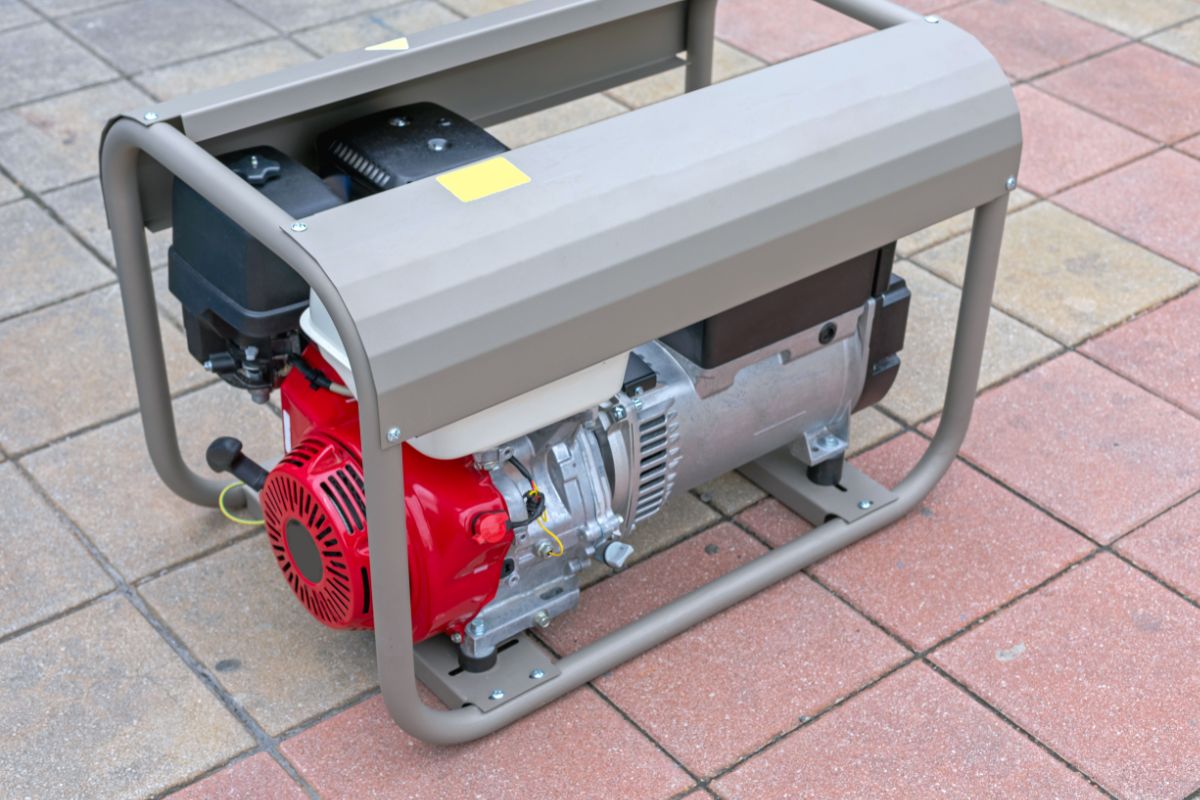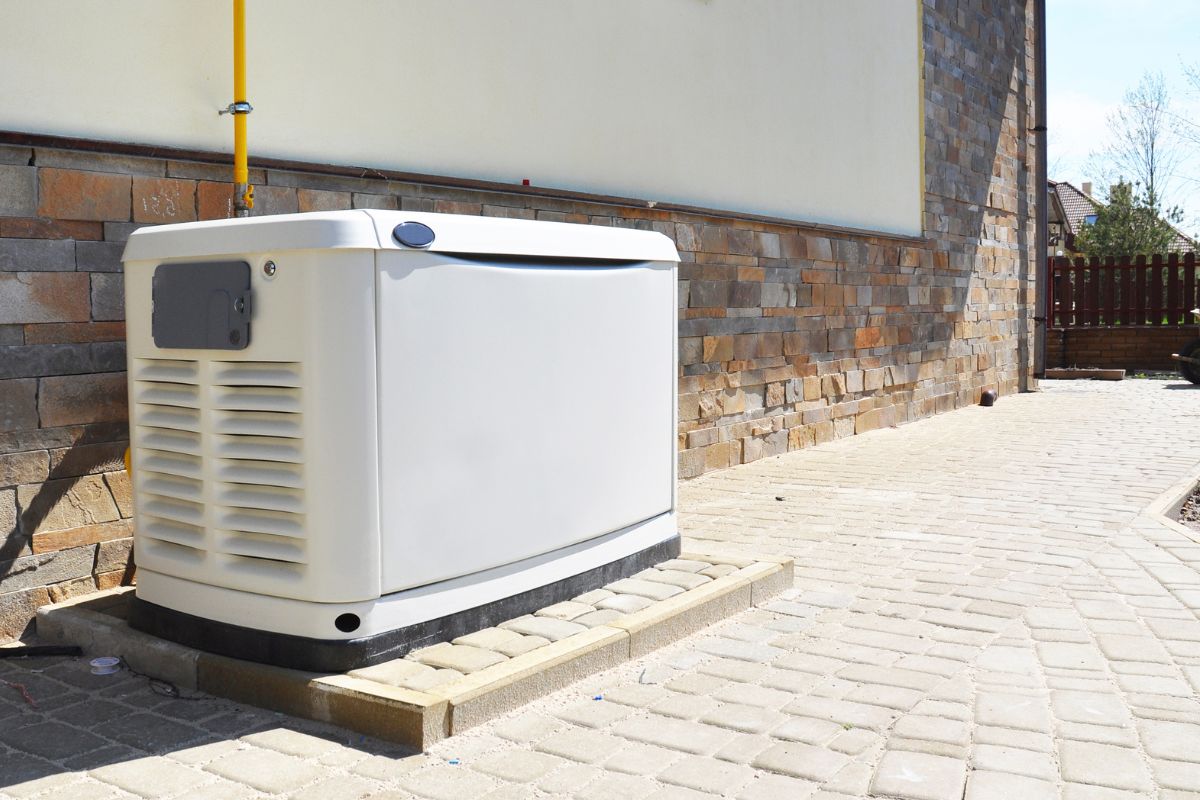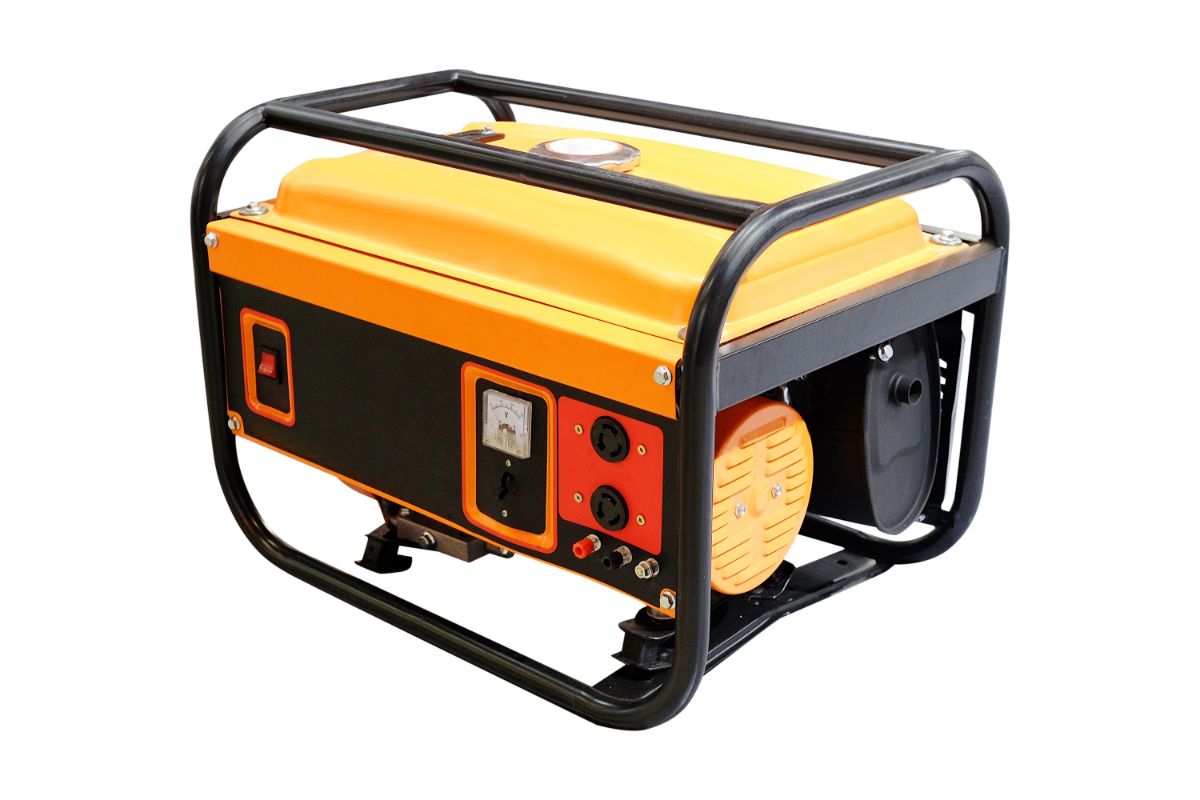Good-quality motor oil, in the right amounts, is key to keeping your portable generator running smoothly for years to come.
Most portable generator owners know how important it is to maintain optimal oil levels because generators often feature low-oil alarms or indicators to prevent engine damage.
Unfortunately, the risks associated with using substandard oil to lubricate your generator are less widely known. Using the wrong kind of oil in your generator can cause the engine to become worn out prematurely or even result in complete engine failure.
Luckily, we’re on hand to help you find the best oil for your portable generator. With our list of the 5 best oils for a portable generator, coupled with our informational buyer’s guide and FAQ section, your generator will be running smoothly again in no time!

Busy day? No problem – check out our top pick:
Generac Full Synthetic Motor Oil 5W-30
- Synthetic oil
- Suitable for most temperatures
- Additives for viscosity maintenance
- Prevents sludge formation
- Includes oil-absorbing pad
OUR TOP PICK
Generac Full Synthetic Motor Oil 5W-30
EDITORS CHOICE
BEST VALUE
OUR TOP PICK
Generac Full Synthetic Motor Oil 5W-30
We feel strongly that the best oil for most portable generators currently available on the market is Generac’s 5W-30 Full Synthetic Motor Oil. `
This is a synthetic oil rated at 5W-30, which puts it at the ideal mid-range viscosity for most generator oils (SAE 30). However, if you note the first number before the ‘W,’ you’ll see that this oil is able to perform in the same way as a very low-viscosity oil in cold temperatures.
This is one of the many awesome features of synthetic motor oils, and we’ll go into more depth about viscosity ratings in our buyer’s guide.
For now, though, trust us when we say that this is probably the best oil you can have on hand for use in just about any generator at just about any temperature.
But that’s not all the Generac Full Synthetic 5W-30 brings to the table! This oil has actually been fortified with an additive to prevent the viscosity from breaking down or forming sludge, both of which can impact performance or even damage your generator.
There’s very little if anything to criticize about this oil. Our only complaint would be that it can only currently be purchased by the quart rather than by the gallon.
However, even this drawback has an upside, which is that these smaller containers will be ideal for travel and match the portability of the generator itself.
As a nice added bonus, Generac as also thrown an oil-absorbent pad into the deal to help make the oil changing process a little bit less messy.
We love Generac’s commitment to customer convenience, and this handy addition really cements the Generac 5W-30 oil as our top choice.
Pros
- Performs optimally in most temperatures
- Additive prevents viscosity breakdown
- Protects against sludge formation
- Oil-absorbing pad included
Cons
- Only sold by the quart
EDITORS CHOICE
Honda Engine Oil 10W-30
Honda is, as we’re sure you know, one of the most trusted manufacturers of engine components and maintenance products.
A reputable company like Honda is always going to be your best bet for something like generator oil, but the benefits of this product go far beyond its manufacturer.
Honda’s 10W-30 Engine Oil is an excellent lubricator for all kinds of motors, from cars to power tools to generators.
The oil is formulated with polymer additives and base stocks to prevent it from becoming overly viscous when the weather gets colder.
If you own a Honda generator, this engine is likely to perform even better for you because of the complete compatibility between your motor components and your oil.
Generator-owners living in especially cold climates may wish to consider other products, however. This is because the 10W-30 viscosity rating for this oil indicates that it thickens more than other formulae when temperatures drop.
Pros
- Very multipurpose
- Formulated with polymers and base stocks
- Ideal for Honda generators
Cons
- Not as functional in cold temperatures
BEST VALUE
Castrol 03084C Edge 5W-30
Castrol’s Edge 5W-30 oil is undoubtedly one of the superior synthetic oils being manufactured right now, and it also happens to be one of the best investments you can make into the longevity and functionality of your portable generator.
As you can see from the viscosity rating of this oil, it meets the ideal viscosity rating for most generators at 30 but will make for easier start-ups in the cold weather.
Beyond this advantage, this Castrol oil offers protection against the formation of deposits that might form in your oil over time and slow the performance or even clog up your generator.
The Castrol Edge 5W-30 is also formulated to withstand and perform well under high pressure. This is important in a generator oil because generator engines exert pressure on the oil to stimulate the flow.
Overall, using this oil in your generator is likely to make the engine more responsive, which is great, especially if your generator is starting to show its age.
Pros
- Performs well in cold weather
- Prevents deposit formation
- Withstands high pressure
- Good for older generators
Cons
- Some reports of incorrect product being shipped
RUNNER UP
Briggs & Stratton 30W Engine Oil
Briggs & Stratton, like Honda and Generac, are another company known for the manufacture of high-performance portable generators.
Therefore, it’s hardly surprising that the Briggs & Stratton 30W Engine Oil is one of the best choices around for portable generators.
This formula has been tested by Briggs & Stratton engineers to ensure the highest possible level of performance and compatibility with Briggs & Stratton generators specifically, although it can be used with most generator brands.
This is an SAE 30 engine oil and a detergent oil, which means it’s been formulated to prevent contaminants like rust from building up in the engine and causing damage.
Another convenient feature of this engine oil is that it comes in packaging that has been deliberately sized according to small engine sizes like those in lawnmowers and generators.
However, because this oil doesn’t have additives to allow for lower-temperature use, this oil isn’t the best choice for generators that are often used in cold weather.
Pros
- Tested by engineers
- Ideal for Briggs & Stratton generators
- Prevents contaminant buildup
- Optimal packaging size
Cons
- Not suitable for very cold temperatures
RUNNER UP
Shell Rotella T6 Full Synthetic 5W-40
If you’re looking for high-quality, multipurpose engine oils, you could do a lot worse than Shell Rotella, especially where the T6 Full Synthetic 5W-40 oil is concerned.
As the viscosity rating indicates, this oil is usually more viscous than the other oils on our list, so it can perform well in warmer temperatures, but thanks to synthetic additives, it can also work much like a low-viscosity oil when it’s colder.
Therefore, this oil is well suited to use climates where it is typically quite warm but where temperature can also drop.
This Shell Rotella T6 5W-40 uses Shell’s Triple Protection Plus formula, which prevents viscosity loss, promotes engine longevity, and protects against contaminant buildup.
This oil is primarily formulated for use in diesel generators and appliances, but it also runs smoothly in gasoline engines.
Moreover, this oil is sold by the gallon, so a single purchase will last you a good few oil changes!
However, be aware of rebate deals when bulk buying online as issues in this area have been the cause of many complaints surrounding this oil.
Pros
- Wide temperature compatibility
- Great for diesel generators
- Works with petrol generators
- Sold by the gallon
Cons
- Some issues with rebate pricing
Best Oil for a Portable Generator Buying Guide
Motor oil can be a surprisingly complicated subject to get to grips with at first. From oil types to consistency and thermal resistance, there’s a lot to think about if you want to keep your generator in good condition for the foreseeable future.
Don’t worry, though – it’s actually quite easy once you know exactly what to look for.
Compatibility
Before you even think about any of the other features of portable generator oil, you will need to make sure that any oil you consider purchasing is compatible with your generator.
Luckily, this typically isn’t too difficult to establish. In fact, most motor or engine oils that are suitable for use in a 4-stroke engine vehicle should be okay to use in your generator.
The oil you use to lubricate your generator’s motor should also be compatible with the surrounding environment as well as the model of the generator itself. The most important factor in this regard is temperature. This is because different oils are formulated to perform most effectively under different temperature conditions.
You can find an oil’s thermal tolerance as part of the viscosity rating, which will be written both on the online product information and the product packaging itself.
If you’ve had little to no experience with motor oils, you might be confused about all the references you’ll see in online guides (including in this article) to ‘viscosity.’
The viscosity of oil essentially refers to its consistency. A viscous oil will have a thick consistency, will flow slowly, and will also feel sticky to the touch.
You don’t want your generator oil to be too viscous because it will likely run too slowly and potentially clog up your generator, especially in cold weather, which typically causes engine oil to run less smoothly.
Similarly, though, motor oil that is too thin won’t build up enough pressure to effectively flow through your engine. Therefore, oil circulation will be slowed, and proper lubrication won’t take place.
Ideally, a portable generator oil should have a viscosity rating of 30 or 40 SAE (SAE just stands for Society of Automotive Engineering), depending on what kind of climate you live in.
Additionally, synthetic oils can be formulated to run more smoothly in cold weather. So, if you frequently experience sub-zero temperatures, you can still use an oil with a viscosity of 30, but you’ll want to use a 5W-30 synthetic variant so that it flows better in the cold.
Although, as we have mentioned, the majority of 4-stroke-compatible oils with appropriate viscosity ratings should be okay to use in your generator, it’s a good idea to check your generator’s manual to see if the manufacturer has recommended any specific oil.
This will normally be the manufacturer’s own brand of oil, which guarantees perfect compatibility. If you have misplaced or thrown away your generator’s manual, don’t worry – you can probably find a copy online.
Oil Variety
There are 2 main types of oil that can be used to lubricate generators. These oil types are synthetic oil and conventional oil.
Most experts recommend using synthetic oil in your portable generator because these oils will have been treated with additives such as polymers and base stocks to ensure that problems like contaminant buildups (think sludge and rust) and sludge formation are kept at bay.
Synthetic oil also generally has more resistance to extreme temperatures than conventional oil, as well as better chemical stability. Since this kind of oil isn’t petroleum-based and doesn’t need changing as frequently due to sludge, it’s even the better choice for the environment.
Because conventional oils lack the chemical refinement of synthetic oils, they tend to cause more wear and tear on your engine components than synthetic oils.
It’s still okay to use conventional oil in your generator while it’s relatively new and functioning at its best. However, as your generator starts to age, using conventional oil to lubricate it is likely to impact its longevity and efficacy.
Quantity
Generator oil is most commonly sold by the quart (or multiple quarts) or by the gallon. This is convenient because you can economize and buy your generator oil in quantities that match your usage.
How often you need to lubricate your generator’s motor will depend on how often you use it. Is it a backup generator that you only use during the occasional power outage, or do you regularly bring your generator on camping trips to power outdoor appliances?
The reason this is important is that experts recommend performing a complete oil change for every 100 hours of run time. So, the more often you use your portable generator, and the longer you use it each time, the more frequently you’ll need to change the oil.
Something else to bear in mind is that the bigger your generator is, the more oil you’ll need on a regular basis to keep it sufficiently lubricated.
To avoid running out of oil at a crucial time (e.g., during a power outage or in the middle of a field on vacation), we recommend buying by the gallon, especially if you make regular use of your generator or if your generator is on the larger side.
However, we realize that gallon containers might not always be convenient, especially if you’re going to be away in the great outdoors.
Therefore, you should use your best judgment based on your usage of the generator to determine what quantities will provide you with enough lubrication whilst also fitting in with your portability requirements.
Additional Features
Worried about the mess involved in changing the oil for your portable generator? You shouldn’t be! Oil changes don’t have to be messy or difficult if you have the right tools for the job.
Unfortunately, it’s rare that you’ll be able to purchase a generator oil with all the tools needed for oil changes included. You will need to have the right kind of screwdriver, for instance, as well as gloves and a funnel.
However, one helpful accessory that you might find included with your new motor oil is a simple oil-absorbent pad. This kind of pad goes a long way towards minimizing the mess of minor oil leaks and spills that can happen during the oil change.











